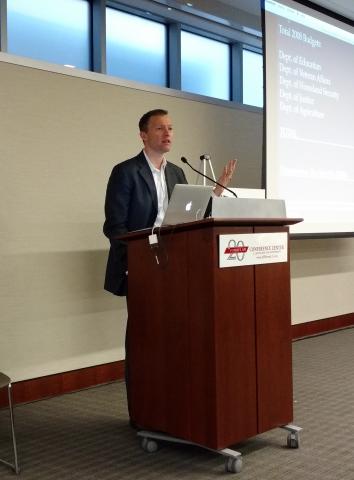
It all began with a snowball.
Arleen’s 14-year-old son Jori and his cousin were throwing snowballs at passing cars. One driver took umbrage, slamming his brakes, chasing Jori into the family’s apartment and kicking down the front door.
When Arleen’s landlord found out about the property damage, Arlene and her two sons were evicted, out on the street.
It was viciously cold out, even for a January in Milwaukee. The temperature fell to ten below; the wind chill, 40 below. Local TV newscasts flashed frostbite warnings. But in Milwaukee, evictions, unlike baseball games, aren’t called just because of the weather.
Author Matthew Desmond shared Arleen’s story Thursday as part of a broader discussion about America’s housing crisis and his compelling and groundbreaking book Evicted: Poverty and Profit in the American City.
The event was sponsored by the National Low Income Housing Coalition (NLIHC), the National Housing Conference and the Coalition on Human Needs. (NLIHC is a CHN affiliate.)
In researching his book, Desmond in 2008 and 2009 followed eight Milwaukee families through the eviction process and its aftermath. Some of the families were white; some were African American. Some included children, others did not. But each family’s story had one thing in common: it involved a complicated mosaic of poverty in a land of plenty, and a downward spiral that led from poverty to eviction to worse poverty to more dangerous neighborhoods to ever-more dilapidated housing with lead poisoning, broken fixtures and, sometimes, no heat or utilities such as running water.
“There is no other democracy that has the depth of poverty that we have and the extent of poverty that we have,” Desmond said. “We can’t fix poverty in America without fixing housing.”
Desmond found that in Milwaukee, landlords evict 40 people a day on average. Shockingly, every two years in Milwaukee, one in every eight renters is evicted. Half of those are “informal” evictions – meaning, a landlord figures out a way to eject his or her tenants without involving the judicial system.
And the racial bias is blatant.
Desmond found that one in every five black African American women in Milwaukee has been evicted, compared with one in every 15 white women.
Once upon a time in America, eviction was rare, and crowds, sometimes huge, would gather to protest a family’s ouster. Not so today. Today, millions of Americans are forced out of their homes each year for not paying the rent. They are forced into shelters, they lose jobs because of geographic relocation or the time it takes to find housing or simply due to the extreme mental stress being evicted evokes. The children are transferred from school to school, if they go to school at all.
All this, in a land of plenty.
“A problem as big as the affordable housing crisis calls for a big solution,” Desmond says. “We have the money. We’ve just made choices about how to spend it.”
Desmond is doing his part. He’s founded Just Shelter, an organization dedicated to raising awareness about the human cost of the lack of affordable housing in our country, and to amplify the work of community organizations striving to preserve affordable housing, prevent evictions and reduce family homelessness.
Ultimately, however, the problem of homelessness, evictions and the challenge we face of ending poverty in a land of plenty won’t go away on its own or even because of Desmond’s skilled research and writing, or the fact that he is donating proceeds from his book to Just Shelter.
It will go away if and when we decide it must.
This post was originally published on the Coalition on Human Needs' blog, Voices for Human Needs. Receive similar articles in your inbox by subscribing today, and follow CHN on Facebook and Twitter.


The views and opinions expressed in this post are those of the author(s) and do not necessarily reflect those of MomsRising.org.
MomsRising.org strongly encourages our readers to post comments in response to blog posts. We value diversity of opinions and perspectives. Our goals for this space are to be educational, thought-provoking, and respectful. So we actively moderate comments and we reserve the right to edit or remove comments that undermine these goals. Thanks!